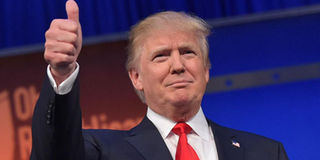Can Trump’s Cabinet save him?

President-elect Donald Trump
What you need to know:
- So whose views will prevail? Could Trump’s secretaries help save Trump from himself — and the country from Trump? Will they offer a sobering dose-of-reality therapy for the reality TV president?
- There are strong arguments for either outcome. I am tending ever so cautiously — clinging perhaps — to the optimistic one.
The Trump administration’s first Cabinet meeting should be an interesting affair. On issue after issue — Russia, the border wall, the Iran nuclear deal, climate change, torture, NATO — President-elect Donald Trump’s nominees have diverged from his stated positions.
So whose views will prevail? Could Trump’s secretaries help save Trump from himself — and the country from Trump? Will they offer a sobering dose-of-reality therapy for the reality TV president?
There are strong arguments for either outcome. I am tending ever so cautiously — clinging perhaps — to the optimistic one.
The official position of the Trump transition is no. “At the end of the day, each one of them is going to pursue a Trump agenda and a Trump vision,” incoming White House press secretary Sean Spicer told reporters Thursday.
Spicer dismissed the nominees’ divergence from Trump at their confirmation hearings as answers when “they’re being asked their personal views here and there.” Wait.
A personal view is if you prefer opera to hip-hop. The nominees’ testimony reflects their policy positions and assessments, in some cases deeply held convictions at the core of future responsibilities.
So it is a significant expression of policy — not a personal view — when Defense Secretary nominee James N. Mattis says about Russia and Vladimir Putin, “I’m all for engagement, but we also have to recognize reality and what Russia is up to. And there’s a decreasing number of areas where we can engage cooperatively and an increasing number of areas where we’re going to have to confront Russia.”
Or when CIA Director nominee Mike Pompeo, similarly, says, “Russia has reasserted itself aggressively, invading and occupying Ukraine, threatening Europe and doing nothing to aid in the destruction and defeat of ISIS.”
Contrast that with Trump, throughout the course of the campaign and as recently as the day before: “If Putin likes Donald Trump, I consider that an asset, not a liability, because we have a horrible relationship with Russia. Russia can help us fight ISIS.”
Trump himself, in an early-morning tweet Friday, purported to be just fine with his team of dissidents. “I want them to be themselves and express their own thoughts, not mine!” he wrote. Right. Everyone who’s watched Trump over the last stretch knows how well he deals with what he perceives as challenges to his authority.
The argument for Trump being tempered, to some extent, by some of his Cabinet (overall, certainly, this is no moderate bunch) is a bet on a combination of Trump’s intellectual laziness and susceptibility to manipulation by deference and flattery.
Trump has few deeply held policy views and seems disinclined, to put it mildly, to put in the work needed to prepare for the presidency, no less inhabit the office. He has never suffered the ordinary politician’s political embarrassment over accusations of flip-flopping.
As a result, he is attached to many of these stances by the thinnest of filaments. He arrived at them by gut, not intensive study. He is more inclined to delegate than to delve into a briefing book. So when approached in the right way, with deference rather than disdain, by a person he considers an ally rather than an enemy, he is susceptible to convincing.
Thus Trump, who had proclaimed that “torture works,” told the New York Times, after meeting with Mattis, that he was “surprised” and “impressed” by the retired Marine general’s rejection of waterboarding, even as he noted, “I’m not saying it changed my mind.”
The strongest argument against this sunny outlook has to do with others in Trump’s orbit, and closer to its center. For every Mattis and Pompeo, for every John F. Kelly (the retired Marine general tapped to head the Department of Homeland Security, who testified that a border wall with Mexico “in and of itself will not do the job’’) and even Rex Tillerson (the former ExxonMobil chief executive nominated to be secretary of state, who testified that “the risk of climate change does exist”), there will be, in the West Wing, a Stephen K. Bannon as chief strategist and senior counselor and Michael T. Flynn as national security adviser. Their records suggest they will inflame Trump’s worst instincts, not restrain them.
Bannon and Flynn have been politically closer to Trump longer; they will be physically closer to him at the White House. Trump could continue to be swayed by the last person whispering in his ear. Or the stature, knowledge and experience at bureaucratic maneuvering of some Cabinet secretaries could, at least at times, avert bad decisions. How all this plays out will shape the course of the Trump presidency.




